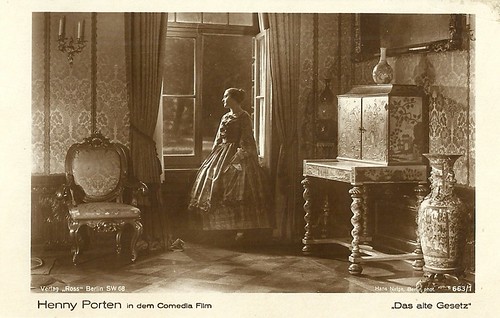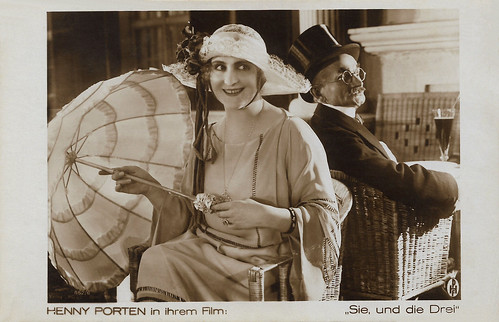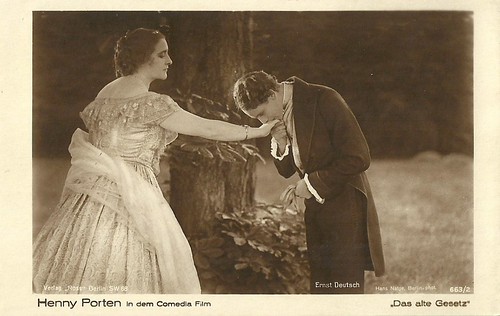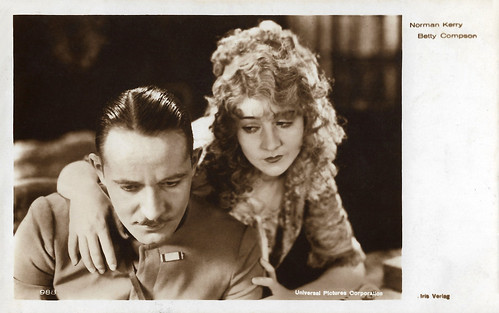
German postcard by Ross Verlag, no. 1268/2, 1927-1928. Photo: Ufa. Lya de Putti in Varieté (Ewald André Dupont, 1925). As Bertha-Marie, she seduces and betrays the simple trapeze artist Stephan Huller (Emil Jannings) and drives him to kill his partner.

German postcard by Ross Verlag, no. 646/5. Photo: E.A. Dupont / HPF (Henny Porten Film). Henny Porten in Die Geier-Wally / Wally of the Vultures (E.A. Dupont, 1921), based on the novel by Wilhelmine von Hillern.

German postcard by Ross Verlag, no. 663/1. Photo: Hans Natge, Berlin / Comedia Film. Henny Porten in Das alte Gesetz (E.A. Dupont, 1923).

Austrian postcard by Iris Verlag, no. 988. Photo: Universal Pictures Corporation. Betty Compson and Norman Kerry in Love Me and the World Is Mine (Ewald André Dupont, 1927).

French postcard by J.R.P.R., Paris, no. 194. Olga Tschechova as Parysia, the rage of Paris, in Moulin Rouge (Ewald André Dupont, 1928). Parysia has a daughter, secretly engaged to Andre, and the boy's aristocratic father objects to the alliance because of Margaret's mother being a revue artist. Dupont took almost a year to make Moulin Rouge at a production cost of $500,000, a huge amount for 1928.

Austrian postcard by Iris-Verlag, no. 5853. Photo: British International Pictures (BIP). Anna May Wong in Piccadilly (Ewald André Dupont, 1929). Gilda Gray was the top-billed actress in Piccadilly, but Variety commented that Wong "outshines the star" and that "from the moment Miss Wong dances in the kitchen's rear, she steals 'Piccadilly' from Miss Gray."
A respected exponent of the German expressionist movement
Ewald André Dupont was born in 1891 in Zeitz in the Province of Saxony in the German Empire. He was often credited as E. A. Dupont. He was the son of journalists Hedwig Friedlander and Hermann DuPont. Dupont was raised in Berlin. where his father was the editor-in-chief of the Berliner Illustrirte Zeitung.
After briefly attending the University of Berlin, Dupont became editor of the Berliner Morgenpost in 1911. In 1915, he established the regular column 'Kino und Varieté' (Film and Variety) in the Berlin newspaper B.Z. am Mittag. Eventually, he became the editor of the Berliner Allgemeinen Zeitung.
As he was friends with various people from the film industry, he turned to cinema. In 1916, he started to write scripts for detective films and also worked as a story editor for Richard Oswald. His first screenplay was for the Harry Higgs detective film Mein ist die Rache / Vengeance is Mine (Rudolf Meinert, 1916) with Hans Mierendorff as Harry Higgs. Within a year, he had had 11 of his scripts turned into films. In 1917 and 1918, eleven of his scripts were filmed by the directors Joe May (Joe Deebs series), Rudolf Meinert (Harry Higgs series) and Richard Oswald (3 parts of the Aufklärungs series Es werde Licht! / Let there be light!). In 1918, Dupont started as a member of the editorial staff of the film magazine Der Film. He was considered an important film journalist in Germany in the 1910s.
In 1918, he was hired by Stern-Film-GmbH as an author and director for the twelve-part detective serial Europa, postlagernd / Europe Mail Storage (1918) with Max Landa. Up to that time, he reportedly had never been inside a film studio. After Alkohol / Alcohol (Ewald André Dupont, Alfred Lind, 1920), Dupont went to Gloria-Film, where he made a series of popular cult films. He worked with Paul Leni on Patience (Felix Basch, Paul Leni, 1920), Der weisse Pfau / The White Peacock (Ewald André Dupont, 1920) and the two-part film Kinder der Finsternis / Children of Darkness Ewald André Dupont, 1921) with Grit Hegesa. Dupont became a respected exponent of the German expressionist movement. He gained widespread recognition with the Henny Porten films Die Geier-Wally / Wally of the Vultures (1921) and Das alte Gesetz (1923).
In 1924, Dupont ran a variety theatre in Mannheim for a season, a milieu that he repeatedly depicted in his films. One of his greatest successes was Varieté / Variety (1925) for Ufa producer Erich Pommer and with Emil Jannings and Lya de Putti. This film, about an ex-trapeze artist, was noted for its innovative camerawork with highly expressive movement through space, accomplished by the expressionist cinematographer Karl Freund. The jealousy drama set in a circus milieu became a worldwide success. Varieté / Variety even did well in the United States, screening for 12 weeks at New York's Rialto Theatre.

German postcard by Photochemie, Berlin, no. K. 2292. Photo: Stern-Film. Max Landa as the cosmopolitan gentleman-detective Joe Deebs in Europa, postlagernd / Europe Mail Storage (Ewald André Dupont, 1918).

German postcard by Photochemie, Berlin, no. K. 2294. Photo: Stern-Film. Max Landa and Lillebil Christensen in Europa, postlagernd / Europe Mail Storage (Ewald André Dupont, 1918).

German postcard by Photochemie, Berlin, no. K. 2298. Photo: Stern-Film. Max Landa as detective Joe Deebs in Europa, postlagernd / Europe Mail Storage (Ewald André Dupont, 1918).

German postcard by Ross Verlag, no. 646/1. Photo: HPF (Henny Porten Film). Henny Porten as Wally in Die Geier-Wally / Wally of the Vultures (E.A. Dupont, 1921), based on the novel by Wilhelmine von Hillern. Sets were by Paul Leni.

German postcard by Ross Verlag, no. 646/4. Photo: Henny Porten-Film. Henny Porten and Wilhelm Dieterle in Die Geier-Wally / Wally of the Vultures (E.A. Dupont, 1921).
Demonstrating his visual flair with two prestige productions
Ewald André Dupont's success was noticed by Carl Laemmle at Universal, who offered Dupont a lucrative contract. Dupont left Decla-Bioskop and joined Universal. His first Hollywood project was Love Me and the World Is Mine in the early summer of 1926, which ran well over budget ($350,000) and was not a success. He could not put up with the working conditions in Hollywood and broke his contract.
I.S. Mowis at IMDb: "Crossing the Atlantic again, he signed with British National Pictures in 1928. He briefly became their leading director, again demonstrating his visual flair with two prestige productions". His first film for British National Pictures was Moulin Rouge (1928), shot in Paris and London and starring Olga Tschechova. It was an international success, thanks to some scenes considered scandalous. The other success was the late silent film Piccadilly (1929), which is remembered for the central performance of the Chinese-American actress Anna May Wong. It was BIP's most expensively made picture up to this time.
In Great Britain, Dupont was involved in setting up the new sound film production in Elstree. He made early sound films in various language versions until 1931. His first multiple-language sound film in London was the film drama Atlantik / Atlantic (1929), a retelling of the Titanic disaster shot in both English and German. It was celebrated in Germany as the ‘first German one hundred per cent talking film’. It was one of the most innovative uses of sound film technology available at the time, but the production was an expensive flop, due mainly to poor dialogue and stilted performances. Hans Michael Bock at Filmportal: "With his next films - Two Worlds (1930), a tragic love story between a Jewish girl and an Austrian officer during the First World War, and the claustrophobic lighthouse drama Cape Forlorn (1931) - each of which was produced in three language versions, Dupont became an exponent of this important production technique during the transition to sound film."
In 1933, the Jewish director emigrated to the United States. His last films in Germany were the circus film Salto Mortale (1931) and the sports film Der Läufer von Marathon / The Runner from Marathon (1933), made during the Olympic Games in Los Angeles. The latter became Dupont's springboard to a new Hollywood engagement. After 1933, he worked at different times for Universal, Paramount and Warner Brothers. Critical success proved elusive, as almost all of his assignments were B movies and low-budget "programmers". He was no longer able to build on his earlier successes and was considered in the American film industry as 'difficult'. On the set of Hell's Kitchen (1939) with the East Side Kids, he slapped a junior member of the cast who had mocked his accent. Dupont was fired and replaced by Lewis Seiler. Unhappy with the lack of opportunities afforded him in Hollywood, Dupont worked from then on as a publicist and also ran an agency for film talent.
Ten years later, he returned to filmmaking when he wrote and directed the offbeat minor Film Noir The Scarf (1951) starring John Ireland and Mercedes McCambridge. After his comeback film was also a flop, Dupont wrote 23 episodes for Big Town (1950–1956), a crime series set in the press milieu, and directed two of those episodes, Tape Recorder (1952) and The Story of Jerry Baxter (1953). He directed several more low-budget films, such as the low-grade Horror film The Neanderthal Man (1953), which I.S. Mowis describes as a "notorious sci-fi stinker". The end of his career came when he was fired from Miss Robin Crusoe (Eugene Frenke, 1953) for showing up drunk once too often. Finally, he was involved in the screenplay for William Dieterle's film biography of Richard Wagner, Magic Fire (William Dieterle, 1956). Shortly before his 65th birthday in 1956, Ewald André Dupont died in Hollywood as a result of cancer. He was married to the actress Gretl Dupont.

German postcard by Ross Verlag, no. 652/5. Photo: Henny Porten Film. Henny Porten and Hermann Thimig in the German silent comedy Sie und die Drei (E.A. Dupont, 1922).

German postcard by Ross Verlag, no. 652/6. Photo: Henny Porten-Film. Henny Porten in the German silent comedy Sie, und die Drei (E.A. Dupont, 1922).

German postcard by Ross Verlag, no. 663/2. Photo: Hans Natge, Berlin / Comedia Film. Henny Porten and Ernst Deutsch in Das alte Gesetz (E.A. Dupont, 1923).

German postcard by Ross Verlag, no. 663/4. Photo: Hans Natge, Berlin / Comedia Film. Henny Porten in Das alte Gesetz (E.A. Dupont, 1923).

German postcard by Ross Verlag, no. 1266/4, 1927-1928. Photo: Alex Binder / Ufa. Emil Jannings in Varieté / Variety (E.A. Dupont, 1925).

Belgian brochure by Patria editions, Antwerp. On the cover is Lya de Putti in Varieté / Variety (Ewald André Dupont, 1925).

Austrian postcard by Iris Verlag, no. 988. Photo: Universal Pictures Corporation. Norman Kerry and Betty Compson in Love Me and the World Is Mine (Ewald André Dupont, 1927).
Sources: Hans Michael Bock (Filmportal - German), I.S. Mowis (IMDb), Wikipedia (French, German and English), and IMDb.
No comments:
Post a Comment